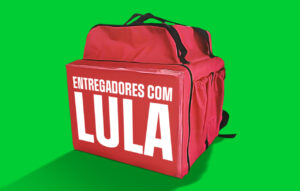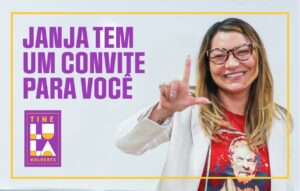Official press release rebuts accusations
Questions and Answers
Former President Lula is once again at the center of intense media bombardment. At the head of the attack, the Globo television network’s national news program aired 40 minutes of negative news coverage in just 4 programs. As has been going on for over two years, Lula is the target of frivolous accusations and conjectures that, despite the virulence of the accusers, do not point to any wrongdoing, much less any evidence. This time, however, besides trying to incriminate Lula by any means, there is a deliberate effort to rewrite the biography of the greatest popular leader in the history of Brazil.
The plea-bargain testimonies by Odebrecht’s owners and executives – in exchange for reduced sentences for crimes they have confessed – are being manipulated to falsify the history of the Lula government. They insist in calling a crime, or favoritism, a government’s public policies aimed at developing the country and approved by the population in four presidential elections.
These are transparent public policies that benefited Brazil as a whole – not just this or that company – like the adoption of national content in purchases made by Petrobras, the construction of dams and integration of the power system, the funding of agriculture, support to the North and Northeast regions, extended credit, appreciation of the minimum wage, and cash transfers that buoyed consumption and boosted the economy, increasing the country’s GDP fourfold.
These policies were not adopted in exchange for alleged personal benefits, as the forgers of history claim. They were the result of the pledge made by former President Lula to strive to afford a more decent life to millions of Brazilians.
That’s why Lula left the government with an 87% approval rating and is pointed by the vast majority as the best president of all times. It is against the people’s recognition that they are trying to create a fake Lula, appealing to prejudice and even to the opinions of those who led the military dictatorship, of those who had Lula arrested for fighting for democracy and the rights of the workers.
In the wild frenzy caused by the edited Odebrecht testimonies, one must recall that these and other Operation Car Wash plea bargainers were pressed to provide versions that compromised Lula. Yet all they have shown, now and then, are assumptions without any supporting evidence.
And we must also recall that this web of lies is being launched against Lula on the eve of a trial before the Car Wash circuit court that is seeking to convict him not only without any evidence, but against all the testimonial and document evidence that proves him innocent.
And also recall that the new media bombardment was started at a moment when, even without being a candidate, Lula is leading the opinion polls for the presidential elections.
For all of that, we must analyze each one of the claims made, to undo every knot of this web of lies.
Has the Odebrecht plea bargain deal provided any wrongdoing perpetrated by Lula?
None whatsoever. Plea bargain testimonies are not evidence, just information provided by guilty pleaders that can only give rise to further investigation. The Brazilian legislation expressly prohibits convictions only on the basis of plea-bargain deals struck in exchange for reduced sentences for those who have admitted crimes. These testimonies must be investigated and submitted to the questioning of defense attorneys. So far, there only exist depositions made before prosecutors, the accusation, disclosed in spectacular-esque fashion before being made available to the defense lawyers.
In the past, depositions disclosed in the same way – as those of Paulo Roberto da Costa, Nestor Cerveró, and Delcídio do Amaral – when confronted with depositions in court by the same collaborators did not reveal any crime or evidence against former President Lula.
It is part of the Car Wash lawfare and use of public opinion strategy, as theorized by Sérgio Moro in a 2014 article, “to delegitimize the political system” leveraging the media and to destroy the public image of its targets in order to replace due process of law with media slandering.
Farm house in Atibaia
For more than a year Car Wash has been investigating a farm house in upstate São Paulo. The owners of the house, which does not belong to former President Lula, have already proven the ownership and origin of the resources used to purchase the estate. Even the testimonies by Emílio Odebrecht and Alexandrino Alencar indicate that they do not know who the estate belongs to, except for the rumors they heard, while the renovation of such estate comes as a surprise to the former president, as he was not involved in any action in an estate that was not his. In this sense, it is strange that Emílio Odebrecht said, just as Lula’s term was about to end, that he had “informed” the former president about the renovation. And it is inadmissible that Lula’s silence, in face of the alleged information, should be construed as evidence. The ranch house does not belong to the former president, there is not a single action he took in relation to it, no undue advantage afforded, no hidden assets, or quid pro quo.
“Lot” and donations to the Lula Institute
As has already been repeated several times and confirmed by testimonies and documents, the Lula Institute has never received any lot from Odebrecht. It is headquartered in a two-storey house acquired in 1991. The alleged plot was refused. And it was refused because it had not even been requested by the Institute or by Lula. And it is proof of the lawfare and persecution against Lula that a plot that was refused has become the focal point of a criminal case.
The Institute received donations from tens of different companies and individuals. All of them were registered. The Odebrecht donations account for less than 15% of all funds collected by the Institute before the onset of a judicial persecution. All the donations were received by directors and duly registered for tax purposes. There has never been any involvement of Antonio Palocci or any other intermediary in the donations raised by the Institute. The testimonies by plea bargainers Alexandrino Alencar and Marcelo Odebrecht even contradict each other on this matter.
The “Friend account”, the virtual millions Lula has never received
This is the most absurd of the conjectures made by Marcelo Odebrecht in his deposition. He said that Lula had a “current account” with the company. At one moment he says the account had 35 million, then 40 million, but stresses that he never spoke with Lula about this account. He tells of a confusing inflow and outflow of funds, citing the purchase of a plot (later returned), a donation to the Lula Institute, and some alleged deliveries of cash to Branislav Kontic, totaling R$ 13 million. He says that part of the reserve was kept in that account.
If the deposition is true, Marcelo Odebrecht had actually made a provisioning in his accounting for unanticipated or future transfers and payments. That is quite different from saying there was a “Lula account” at Odebrecht, as reproduced by reckless headlines. If true, this was clearly an internal decision by the company. A merely virtual “account” that was never transferred, not in whole or in part, that never materialized as direct or indirect benefits to Lula.
The fact is that Lula never asked, authorized, or even had any knowledge of such provisioning.
The three alleged pieces of evidence submitted collapse in face of reality, namely: a) the plot supposedly bought for the Lula Institute was never delivered because it was never claimed by any rightful owner; b) the donations made by Odebrecht to the Lula Institute were made openly, their amounts entered in the accounts, and informed to the Internal Revenue Service, in a transparent transaction; c) Branislav Kontic’s defense denied, in a written statement sent to Jornal Nacional, that his client had perpetrated the actions described by the plea bargainers.
Lula and his family’s bank, tax, and phone records were investigated. The Public Prosecution knows the origin of all the funds Lula received, the destination of every cent earned by the former president from his talks, and that Lula lives in an apartment in São Bernardo do Campo since the 1990s. Where is the R$ 40 million?
Talks
After leaving the Presidency, with an 87% approval rating and world acclaim, Lula delivered 72 talks to over 40 companies. Among them Pirelli, Itaú, and Infoglobo. The same fee was charged for every talk. All were held, and proof of everything related to the talks is in the hands of the Public Prosecution of the Federal District and Paraná state. The press made it look like Odebrecht had “invented” these talks. That was not said at all even during the depositions, which indicated that the talks were licit and legitimate. And Odebrecht was not the first company, or the second, or even the third to hire Lula as a keynote speaker. Microsoft, LG, and Ambev, for example, hired talks for the same fees BEFORE Odebrecht. The complete list with the talks given between 2011 and 2015 is available at http://Institutelula.org/uploads/relatoriopalestraslils20160323.pdf
The Brazilian law does not prohibit former presidents from giving talks. Nor does it prohibit them from being company directors, which Lula has never been.
Aid to a son
After he left the presidential office, Lula was no longer a public employee. Even accepting as real the testimonies of plea bargainers who need evidence to back them, Emílio Odebrecht and Alexandrino Alencar say that the aid for Lula’s son to start an American football league was voluntary, and after several conversations and analysis of the project. The expression included in the deposition of a “quid pro quo” for improving relations between Dilma and Marcelo Odebrecht is generic and again, even if real, does not infringe any law. In 2011, the year related to the depositions, Lula held no public office.
The American football league existed, yet had no participation nor was accompanied by Lula. For years the former president’s children have been rumored to be billionaires on the Internet. They had their accounts investigated and activities analyzed. And they are neither billionaires, nor owners of farms or Friboi.
Friar Chico
Again, even if we consider the testimonies by plea bargainers who need evidence, any relation between Odebrecht and Lula’s brother were private relations. Lula’s eldest brother is not under his tutelage. Lula neither asked for his help, nor looked after his brother’s life. There is no mention of infringement, of any compensation, or that the former president’s brother asked for any help from his brother.
Carta Capital magazine
The brief mention to the magazine mentions that Lula said to Emílio Odebrecht if he could do anything to help the magazine, once again after he had left the presidency. The relation between two other private entities (Carta Capital and Odebrecht) has nothing to do with Lula and his asking whether they could advertise in the magazine does not entail any wrongdoing. The Odebrecht executives mentioned the group helped out several other media outlets – the example mentioned was newspaper O Estado de S.Paulo.
Angola
Emílio Odebrecht’s deposition states that the services hired from company Exergia, to deliver services in Angola, were actually delivered. One of Exergia’s partners is Taiguara dos Santos, a son of Lula’s first wife’s brother. If later on, after services were interrupted in Angola there was an advance between two private parties, it had no involvement of the then former president, nor is that mentioned in the depositions. Lula has never received any money from Exergia or from Taiguara, and that has already been investigated by the Federal Police, which could not find any money from that company in Lula’s accounts.
This case is already being analyzed in a criminal suit by the Brasília Federal Justice. Should the plea bargainers’ depositions be proven to be true, the lawsuit’s main argument is groundless; the accusation that no services had been delivered and that they were just some form of bribery or kickback crumbles to the ground. That is, in this case not only do the testimonies fail to show any crime, but they actually also prove Lula innocent in this lawsuit.
Electoral donations
Emílio Odebrecht’s deposition explicitly states that he had never discussed amounts or forms of electoral donation with former president Lula. Lula did not take care of campaign or party funds.
The PT and the former president have always argued for the end of private campaign funding. However, the Supreme Federal Court only ruled against contributions by legal persons in 2015.
The former president never authorized anyone to ask for any donations as compensation for governmental actions of any kind.
Corinthians Stadium
Even if we consider the testimonies by plea bargainers true, there is no mention to any illegal action by the former president regarding the private stadium of soccer team Sport Club Corinthians. In 2011 the city of São Paulo ran the risk of being left out of the World Cup. The former president always advocated using the Morumbi Stadium, as publicly stated by deceased president of São Paulo F.C. Juvenal Juvêncio, but in 2011 that stadium was vetoed by FIFA. The Corinthians stadium actually was a smaller project. With the possibility of hosting the World Cup opening ceremony, Corinthians built a bigger stadium. The stadium, and this is obvious, is not Lula’s, it belongs to Corinthians. Not only is it often crowded, but also Globo TV network, a for-profit private company, has even used the empty stadium as a studio for its television programs.
Lula and the presidency
Lula is considered in every poll the best president of all times, even with the intense media campaign led against him. Lula is also the only president in the history of the Republic to have come from the working class, to have born in the poverty of the Northeastern arid region, a migrant raised by his mother. The only one to have overcome all these hardships to become the president who took the name of Brazil the farthest worldwide.
Lula has always abided by the law and acted in favor of Brazil before, during and after the presidency, when he went back to the same apartment he lived in São Bernardo do Campo before going to Brasília.
It was not only Odebrecht that grew during the Lula government. The vast majority of the Brazilian companies, small, medium-sized, and big, grew over that period. Millions of jobs were generated while poverty and hunger were reduced to unprecedented levels in the country. It was all of Brazil that grew over the period of greatest economic prosperity in Brazilian democracy.
It is time to ask who is interested in destroying Lula when the former president takes a stand against the end of labor and social security rights. Who is interested in destroying Lula when the Brazilian riches – mineral reserves in the Amazon region, pre-salt deepwater oil reserves, state-owned companies – are being sold for peanuts? Who is interested in rewriting the biography of the country’s most popular leader?




